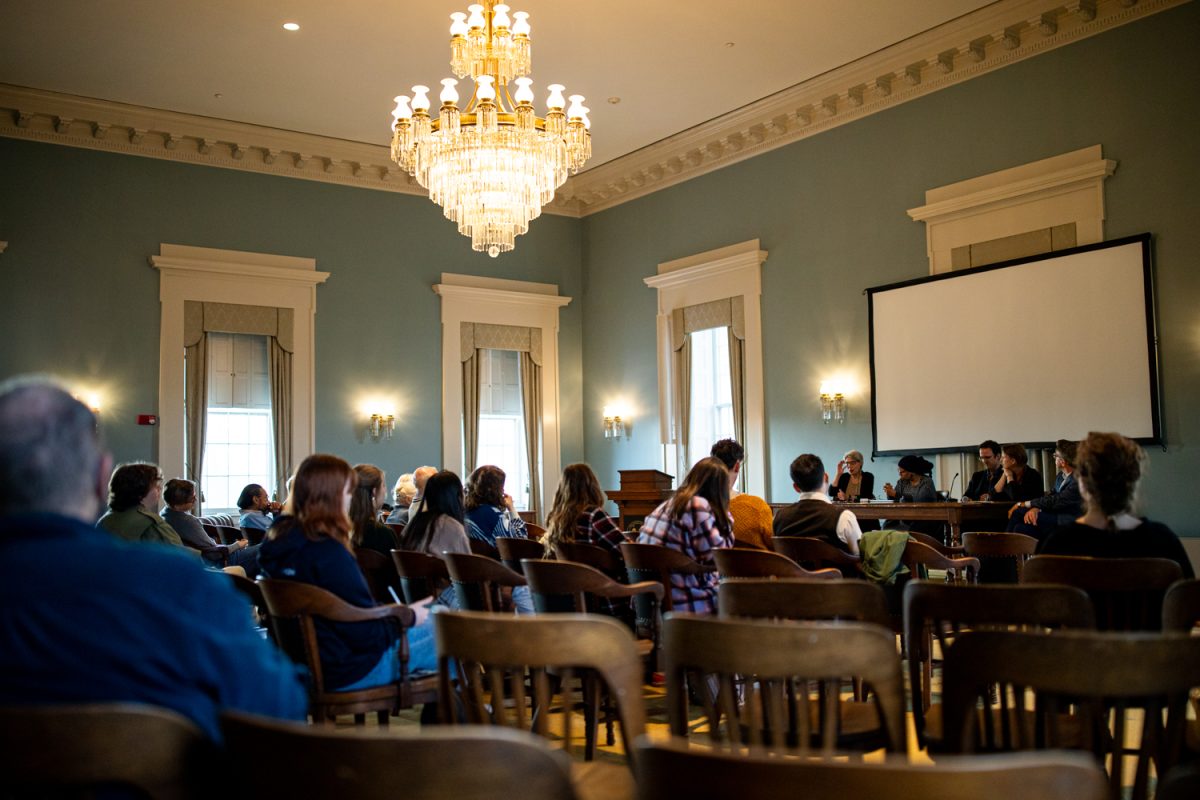On a rainy fall evening in Iowa City, scholars of theater and English gathered in the University of Iowa Old Capitol Museum to discuss the impact of the first folio of William Shakespeare 400 years after its creation.
The event was moderated by UI English Department Chair Blaine Greteman on Oct. 11, and featured four panelists who contributed a wide range of perspectives on Shakespeare. Tracie Morris, Mary Mayo, Gina Hausknecht, and Adam Knight spoke at the panel.
Shakespeare’s first folio was published in 1623, approximately seven years after his death.
Iowa City, as a UNESCO City of Literature, is considered an exemplary arts community that proudly welcomes writers. Morris, a resident of the Iowa Writers’ Workshop, said she feels Shakespeare would not have found Iowa City to be a completely foreign experience.
“We love writing and writers here,” Morris said. “I doubt that [Shakespeare] would feel completely out of place. He also made his home everywhere.”
Despite the four centuries since Shakespeare’s work, Morris shared that much of Shakespeare’s writing is still topical for people today. She indicated that poor education of Shakespeare’s work can make it seem inaccessible, but once students truly engage with his work, they find that it resonates.
“He’s like one of the best artists, best writers to have ever lived, but that fact makes him more accessible,” Morris said.
Mayo, an associate professor of instruction and vocal direction at the UI and former Shakespeare production consultant, spoke about the relevance of Shakespeare for students and how students can learn from and relate to Shakespeare’s works many years later.
Currently overseeing the theater department’s production of “Macbeth” this semester, a well-known Shakespearian tragedy, Mayo shared students were able to learn effective communication through language via Shakespeare, who was often criticized and praised for creating his own grammatical and language patterns in his work.
Likewise, she shared that young people today are developing their own habits of language by abbreviating expressions and creating languages to speak to one another.
“Language is a tool that can be extremely effective,” said Mayo. “It just reminds us of how effective the right words at the right time can be.”
Hausknecht, the third panelist who is a professor of English and creative writing at Coe College, also spoke about the importance of language for young people and how they can learn from Shakespeare.
Every generation has its own uses for language, but Hausknecht shared that Shakespearean language is particularly relevant today.
“I think this texting generation has come up with these whole other sets of idioms and rhythms. There is something kind of Shakespearean about that,” Hausknecht said. “He made up so many words [for which] he was criticized by his peers.”
Hausknecht said while language is something that can deter students from engaging with Shakespeare, it shouldn’t. She encouraged curiosity about Shakespeare and challenged what is commonly thought about his work.
“If I have anything to say to students, it’s to not put Shakespeare on a pedestal. Forget about the pedestal — read something or go see a play,” Hausknecht said. “Put aside everything we’ve been told about, and instead be curious as to why. Why are we still performing?”
Knight, the fourth panelist and producing artistic director at Riverside Theatre, shared that one of the tasks of theaters is to determine the “why” of performing Shakespeare and to find relevance in his works for modern, local audiences.
“The gift of Shakespeare is that he can meet you where you’re at,” Knight said. “I think that a production of Shakespeare in Iowa City needs to be different from a production in London or New York, so our task as theater-makers and scholars is to find the ‘why’ now.”



